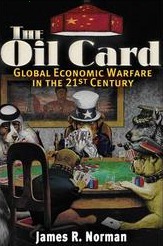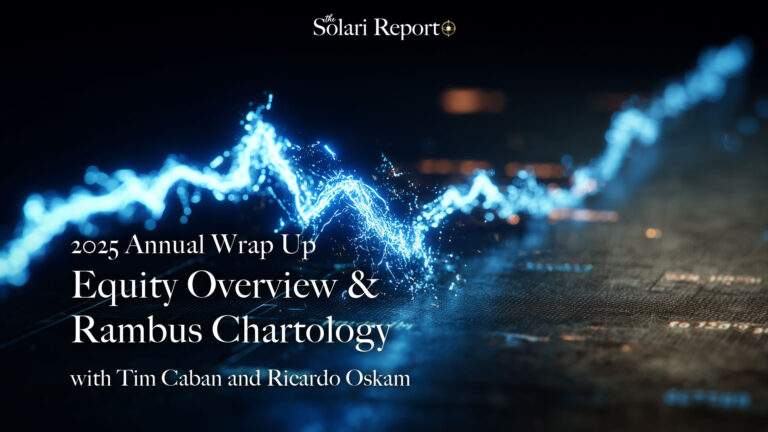 I just finished James Norman’s new book: The Oil Card: Global Economic Warfare in the 21st Century.
I just finished James Norman’s new book: The Oil Card: Global Economic Warfare in the 21st Century.
Norman makes the case that a suppressed oil price was the most important strategic variable in bringing down the Soviet Union two decades ago and that engineering an inflated oil price is now being used to keep China in check. He makes the case that the war in Iraq was driven first and foremost by the importance of keeping the oil price up and China out of a strategic position in the Middle East.
If you want to expand your understanding of the fundamental nature of the political economy and economic warfare in which we live, this is a very good read.






















































































































I’ve looked into and even written a fair bit about “peak oil”. What bothers me most about peak oil is the lineage of the dude who “put it on the map” – Mat Simmons. I’ve never met him and I’ve heard him interviewed many times. He sounds brilliant and really seems to know his stuff.
I’m troubled that Rev. Lindsey Williams [you have to do your own reasearch here, as I did] sounds equally credible and he refutes Simmon’s hypothesis.
I do believe that we have achieved “peak production” from existing infrastructure but I question whether or not we have really achieved peak reserves. I do believe that there are “known reserves” that are not acknowledged – because it is politics and its all about control.
Getting back to Simmons – he is a memeber of the Council On Foreign Relations [CFR]. The CFR are categorically globalists, throughly documented as a group using unscrupulous means to achieve their agenda [yes, they do have one] since they were founded by Edward Mandel House – who coincidentally is widely understood to be one of the prime architects of the Federal Reserve Act serving in his role as prime advisor to President Woodrow Wilson and if you do enough reading – you would know that Edward Mandell House was also one of the most influential persons responsible for “lobbying” Wilson to enter WWI.
For me, I would find “Peak Anything” a whole lot easier to embrace if a CFR member was not promoting it.
Rob Kirby
Jim, thanks for chiming in! I should have the book this weekend, so I’ll post back here with my thoughts after I read it.
My initial reaction is that we wouldn’t necessarily have to choose between the reality of Peak Oil and the reality of economic warfare that you describe. It looks like Mexico’s oil production has been plummeting, Canada’s is somewhat dubious (consisting of very difficult-to-process tar sands), Russia’s may be going back into decline, Kuwait and Indonesia are in decline, Saudi Arabia is either restraining production (as you mention) or it’s declining on its own, Western Oil Majors’ market share is dwindling (around 10-15% of total world production depending on whose numbers you believe), and China is still managing to put cars on the road at an increasing pace. So if there’s any sort of racket or leveraged control going on here, it’s HIGHLY leveraged and I don’t know who the key players are to pull it off.
However, none of that is to suggest that your thesis is incorrect. I’ll have to read the book and see if I see any obvious flaws, but my guess is you’re uncovering easily overlooked and important points to what’s going on with the energy economics scene. Especially compelling are the dollar dynamics and oil route control mechanisms you mention above. I also am tired of reading the same Peak Oil theses (many of which I agree with), so I welcome another angle here.
Rob:
The book has a short take on Matt Simmons, who I respect and profiled in the mid-1980s for BusinessWeek in what was the first major-media exposure for Simmons. At that time, he and his investment banking firm were beating the drums for an entirely different worldview on oil which claimed we would be perpetually awash in the stuff and there would never be a recovery in oil prices. He used this effectively to browbeat loss-plagued oilfield service firms into joint-venturing their then-moribund oil patch subsidiaries. This was also a clever way to dodge immediate write-offs and turn back the clock on the time requirement under accounting rules for recognizing asset impairments.
Interestingly, that was right at the time the Reagan NSC was trying to drive down oil prices against the Russians, and coincided with a spate of stunning and massive reserve write-ups by Kuwait, Iran, the Saudis and others which further helped create the impression the world had many centuries of proved oil in the ground.
Now the agenda had changed. To push up oil prices, the managers need to create a milieu of chronic shortage ahead and Matt has leaped on that bandwagon by now badmouthing the veracity of Saudi reserve calculations. Coincidentlaly, his family (through SCF Partners) now stands to make a killing on the inflated valuations on a myriad of oilfield service compaanies it acquired in the doldrums. There is no question Matt Simmons is smart. He may even be sincere in what he says. But he is also inherently conflicted due to his family asset holdings. How anyone can flip-flop so dramatically in their thinking is a puzzlement. JN
On Matt Simmon, see http://markinthepark.net/blog/?p=1477
I’m not an expert on oil, energy, politics or economics, but if you sniff behind a lot of the recent scares (global warming, aids, sars, bird flu, and peak-oil), you find a small group of people (or interlocking groups) who know how to exploit these to the hilt to further their agendas, regardless of whether there is any rational basis for the scare or not. And if the scare does not scare enough people enough (or fast enough), they are quite capable of manufacturing a new one (or as many as necessary). These groups are not beholden or loyal to any particular nation or state, tho they often hide behind politicians and governments. It makes little sense to talk about “us” because these people don’t give a shit about you. These people are not primarily after money. (It is instructive to read “Mankind at a Turning Point” (1974) for instance, and compare it to what is happening now, 30 years later, here and here and a short video here.) My attitude is, oil may or may not be running out, but it stands to reason that those who run the planet will manipulate supplies and prices as part of a general shakedown and to sweep yet more people into deeper serfdom. I mean, shit! Why wouldn’t they? This is the same-old, same-old of elites from time immemorial, using 21st-century techniques; and this time, the prize is control of the world population.
Great Arguments and a profound Look into History are both offered by Mr. F. William Engdahl with his Book : A Century of War / Anglo-American Oil-Politics and the New World Order
His Site is here : http://www.engdahl.oilgeopolitics.net/index.html
The Peasants’ Oil
September 3, 2008
Alvaro Vargas Llosa
http://independent.org/newsroom/article.asp?id=2307
WASHINGTON—Little international attention has been paid to the recent conflict between the Peruvian government and thousands of indigenous people in the oil-rich Amazon region over President Alan Garcia’s attempt to make it easier for tribal communities to sell their land. The issue contains lessons for the entire continent—in which the tension between modernity and tradition is a recurring source of strife.
In May and June of this year, the Peruvian government passed two decrees that reduced the consent necessary for peasant communities, including tribes, to sell their land from a two-thirds majority vote to half of the participants in an open assembly. The norms, aimed at native communities all over the country, triggered a monumental rebellion in the Amazon jungle, an area rich in hydrocarbons that has largely been earmarked for oil and gas exploration and where about 300,000 indigenous people live in abject poverty.
Under pressure from nongovernmental organizations and leaders of indigenous movements, the Peruvian Congress repealed the decrees, but the government is trying to rescue part of its proposal through some form of negotiation.
The authorities argue that changing the protectionist laws would lead to a modernization of some of the poorest parts of the country through massive private investment. Critics argue that the natives would be easily manipulated by big companies whose energy projects would devastate the environment and the inhabitants of the rainforest.
The political confrontation has obfuscated the real problem, which is one concerning property rights as they affect the subsoil. As in other parts of Latin America, the Peruvian government has long claimed ownership of the subsoil. The implication is that, unlike in the United States, for instance, if a person, a family or a community holds a title over a piece of land, they do not own what is underneath it.
Those competing claims are a recipe for disaster. Every time a government wants to encourage economic development by inviting foreign and local mining or energy companies to invest in a project, the residents in or around the relevant area feel threatened. Since the only way for them to protest effectively is to rally behind the politicians and pressure groups that speak in their name, the residents, most often peasants, all too often flock behind people who are interested in their own socialist notions of development or their own careers.
The government’s ownership of the subsoil is founded on centuries-old laws that, according to Enrique Ghersi, a Peruvian scholar who argues for the end of the state’s ownership of the subsoil, have been grossly misinterpreted. Universal principles of ownership that go back to Roman law recognize that people who have a title to real estate extend their dominion below the surface.
In the case of the Peruvian conflict, another issue of principle is at stake. The norms that currently require a two-thirds majority vote for a community to sell the land are a collectivist imposition whose ancestral roots are extremely doubtful. While they do go back to colonial times, when under pressure from the Catholic Church the Spanish Crown sought to protect the native population from the private abuses of Iberian colonists, the legal arrangements were compounded in modern times by socialist experiments that impeded the development of native Peruvians.
The indigenous leaders who invoke “tradition” to keep the two-thirds majority vote are, of course, terrified of letting their own people choose freely. In that respect, Garcia is right to want to allow for more freedom of choice for the members of native communities. But because the government owns the subsoil, what should be a dispute between peasants wanting to exercise individual rights and community leaders standing in their way has become a fight for the survival of the indigenous people against a government willing to let Big Oil usurp their turf.
If the peasants owned the subsoil and its resources, one can only imagine the rebellion that would take place in many of the communities of the Andes and of the Amazon basin against the leaders of organizations such as the Inter-Ethnic Association for the Development of the Peruvian Forest, who have been at the forefront of the recent battle against the authorities. How would they tell a peasant sitting on billions of dollars worth of oil or gas, and willing to either sell, partner with or give a concession to a private investor, that “tradition” requires him to stay miserably poor?